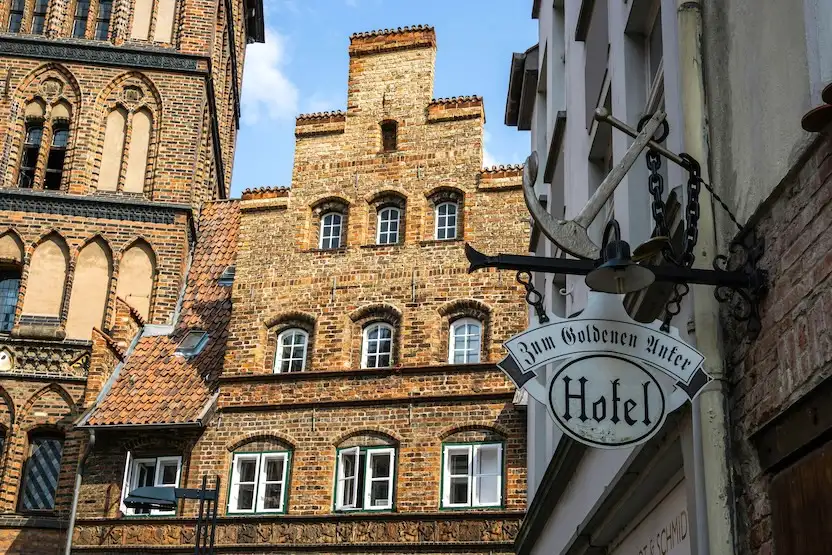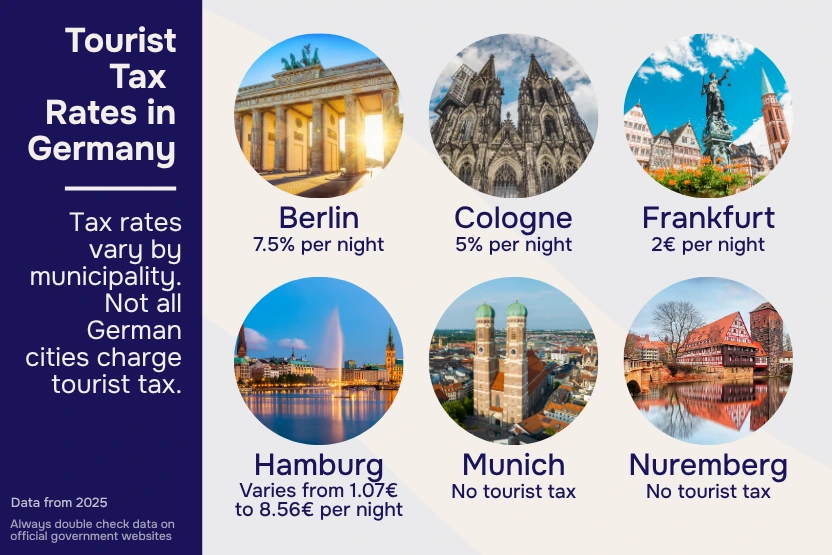
Heading to Germany? You May Have to Pay a Tourist Tax
Sarah Pardi - December 30, 2025
Home > Travel Requirements, Policy & Authorization > Heading to Germany? You May Have to Pay a Tourist Tax
Share this post
Different travelers need to worry about different administrative processes before visiting Germany. For instance, some tourists have to apply for a visa, which comes with other requirements like getting Schengen travel insurance.
There are some things that all tourists need to know before heading to Germany, and one of those things is the tourist tax.
It isn't uncommon for countries, regions, and cities to tax visitors. Many European countries and cities do have taxes set in place. But what about Germany? And how much will you be expected to pay?
Well, it all depends.
Germany has a tourist tax
Germany does have a tourist tax, but it isn't a standard percentage or cost across the board.
Many European countries, Germany included, leave the taxation rate up to the municipalities, regions, or cities themselves. For instance, you'll find different tax rates throughout Spain, Portugal, and Greece.
The German government, within pre-determined boundaries, allows its cities to decide whether or not to establish a tourist tax and at what rate.

How Germany's tourist taxes work
Throughout Europe, most tourist taxes work the same way. One, it is applied to tourists visiting the city (i.e., non-residents). Second, it typically applies to overnight stays, but not always. For instance, Venice has a summertime day tax.
Heading to Germany?
Don't forget about your travel insurance!
In Germany, typically, travelers are taxed per night, and it is the lodging's responsibility to collect said tax. It is often collected by your hotel, Airbnb, etc., either when you book or at the end of your stay.
Some cities may charge a percentage of the cost of your overnight stay, while others might charge a flat rate.
This means if you're staying with a friend or family member and are not paying them, you do not have to pay the tourist tax.

Germany's tourist tax varies by city
As noted above, the tax rate varies by German city. Here are the rates for some of the most popular destinations in Germany.
Tourist taxes in Berlin
Berlin introduced a tourist tax in 2014. Initially, it didn't include business travelers, but they changed this in 2024. Today, the tourist tax applies to all non-resident guests.
In 2025, Berlin's tourist tax increased to 7.5% (from 5%).
If you're staying in Berlin and have booked accommodations, you will be required to pay a 7.5% tax per night, whether you're staying in a hotel, private rental, hostel, or any other type of accommodation.

Cologne's tourist tax
Also starting in 2014, Cologne's tourist tax is required for all non-resident travelers renting accommodations in the city. This includes hotels, hostels, private rentals, even campgrounds, and boats.
Cologne's tourist tax is 5% per person, per night.
Currently, the tax only applies to tourists, not business travelers. Double check before you head abroad, though, as policies can always change.

Frankfurt's tourist tax
Frankfurt introduced its tourist tax in 2018. Unlike most German cities that have tourist tax schemes, Frankfurt charges a flat rate per night instead of a percentage.
Frankfurt's tourist tax is 2€ per night.
Hamburg's tourist tax
Hamburg's tourist tax works on a sliding scale. The rate depends on the net price of the overnight stay, and it is a flat rate.
Nightly rates up to €50: €1.07
Nightly rates up to €100: €2.14
Nightly rates up to €150: €3.21
Nightly rates up to €200: €4.28
Nightly rates up to €250: €5.35
Nightly rates up to €300: €6.42
Nightly rates up to €350: €7.49
Nightly rates up to €400: €8.56
It applies to hotels, hostels, private rentals, and other types of paid accommodations.
Munich's tourist tax
Munich does not currently have a tourist tax.
Nuremberg tourist tax
Nuremberg does not currently have a tourist tax.

How to pay the tourist tax in Germany
Germany has made it very easy to pay your tourist taxes, so you don't have to worry about any complicated processes.
It is the responsibility of the accommodations you booked with to collect the tax.
When they collect it depends on their internal processes/booking systems, and when you pay for your stay.
It's possible to pay it at the time of booking, when you submit a total payment, or even after you have already paid for your accommodations, and it's the end of your stay.
When you make your booking, you can check the price breakdown to see whether or not the tax has been included.
It isn't uncommon to pay the tourist tax on-site, and some hotels may even require it to be paid in cash.
Your booking platform, hotel, or other service will be able to tell you how the tax will need to be submitted and when.

FAQs: German tourist tax
You might also like...
Best Places to Visit in Germany That Aren’t Berlin or Munich
Travel Adapters for Germany: What You Need
How to appeal a rejected German visa
Schengen Visas for Germany: What to Know
Related posts
Upcoming travels ? Get Insured !
Find the right insurance for your trip by using our powerful comparison tool!
Sarah Pardi - February 19, 2026
Sarah Pardi - February 13, 2026
Sarah Pardi - February 12, 2026
Sarah Pardi - February 6, 2026





